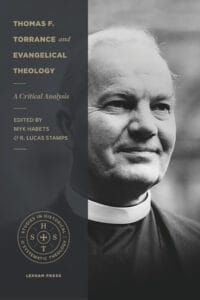
Thomas F. Torrance and Evangelical Theology: A Critical Analysis brings Torrance into closer conversation with evangelical theology on a range of key theological topics. In this interview with the volume editors, Myk Habets and R. Lucas Stamps, we discuss the origins and goals for the book.
Lexham Press: What is the story behind Thomas F. Torrance and Evangelical Theology: A Critical Analysis?
R. Lucas Stamps: I read Thomas F. Torrance in graduate school and ended up writing on his Christology in my dissertation and in some subsequent publications. He was arguably the most important English language theologian of the twentieth century, and there is a growing body of academic literature on his theology. But over the years I have noticed (and lamented) that his influence is relatively subdued among evangelicals. So I teamed up with a leading expert on Torrance’s theology (and a fellow evangelical Baptist), Myk Habets, to seek to remedy this lack of attention.
Myk Habets: This book started with an email from Luke, who had the idea of doing a Torrance version of the Barth book that came out some years ago that recommended him to Evangelicals. I had met Luke at several conferences and we had communicated online for a while, so I trusted his instincts and looked forward to working with him as an editor. I instantly agreed and we set about constructing a wish-list of contributors and a list of topics that would have to be covered.
LP: What holds these essays together?
Stamps: The book brings Torrance’s rich theological program into conversation with evangelical theology on a range of important theological topics.
Habets: The key idea of the book is to ask and answer why it is we think Evangelicals should read the work of Thomas F. Torrance, account for reasons why he might not be read more widely, explain some of his core convictions, and then critically interact with his work to show its fruitfulness for Evangelical thought, worship, and practice. We felt that Torrance’s work should not be passed over by Evangelicals, but critically received.
At the heart of Torrance’s theology is the conviction, from Scripture and the tradition, that Jesus is the exclusive two-fold movement from God to humanity and humanity to God. Christ is our High Priest, Mediator, Savior, Model, and King. What Evangelical would disagree with that! But, Torrance goes further and takes this as seriously as anyone in the Tradition, and argues for the vicarious humanity and ministry of Christ. This is something that is fundamental to the Gospel and yet subtly eclipsed in much modern Evangelicalism. This book is an attempt to in part, correct this. To do this, a clear and compelling doctrine of the Trinity is required, a mature and faithful commitment to the authority of Scripture is needed, and from there, everything else will flow. This book is a partial contribution to the renewal of Evangelical thought and practice today.
LP: What do you hope your book contributes?
Stamps: Several of these essays offer important scholarly contributions to debates in Torrance studies. Some of them are devotionally oriented and practically relevant. All of them are carefully researched and artfully written and reward careful attention. In the end, I hope that this book will send readers back to Torrance’s own writings.
Habets: Evangelicals rightly prioritize certain areas of systematic theology in order to emphasize what they believe are core convictions that Jesus would have us inculcate. In this work, we ensured these key areas were addressed, and as such the book makes a significant contribution to how Evangelicals (and others) might view the place and function of Holy Scripture as a living Word. Epistemological concerns are paramount, especially in our post-modern, Post-Christian context and so these themes get special treatment in this work. Torrance’s epistemology is radically Christocentric, more so we argue than most Evangelical accounts, and here Torrance can help Evangelicals a lot. The work of Christ, atonement, ad sanctification are areas that are becoming splintered and fractured in Evangelical thought, so a number of the chapters take us back to Scripture and then through tradition to help us think rightly about the work of Christ and what it means for our justification and sanctification. Finally, Evangelicals are activists, those who put Jesus’s words into action, and so in the final parts of the book we contracted a range of essays on a range of practical topics from vocation to domestic violence to illustrate how good theology results in good thinking and is worked out in good practice. It is our hope that these contributions to Evangelical thought will be widely consumed and critically received.
LP: What drives you to write?
Habets: There are many reasons for writing, some of the more important to me include the compulsion to share the good news, to articulate beliefs with precision and faithfulness, to initiate a conversation that I think is important and fruitful, to fill in some gaps in our thinking or practice, to invite new and emerging voices into important conversations, to expose poor thinking and replace it with more faithful accounts of God and his ways. We are each gifted and called to contribute in some small way to the great tradition that is the Church, and offering my small gifts of writing is one way I fulfil my call to discipleship. I write, in other words, to honor God and his people.
Stamps: Acknowledging that mixed motives are always present, I try to write as an expression of love: loving God with all of my mind and loving my readers as myself.
LP: Share with us something surprising about yourself that only your friends would know.
Habets: I love B-grade comedies that are so silly you can’t help but laugh at them. The Steve Martin, Martin Short, Chevy Chase type stuff. “Surely others do too, right.” ”Don’t call me Shirley!”
Stamps: I’m a huge fan of the harpist and singer-songwriter Joanna Newsom. If you know, you know.







